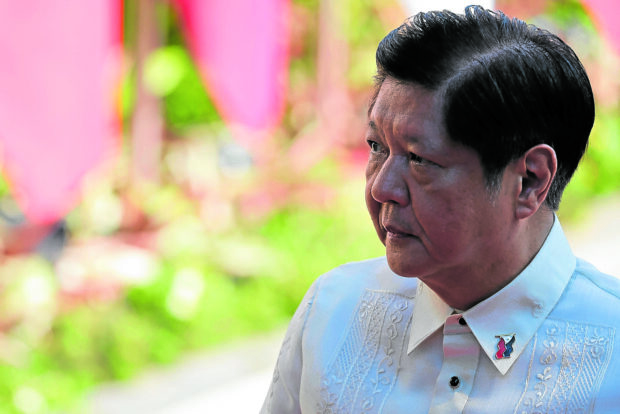Marcos pushes conduct code in disputed waters

EXHAUSTED Looking more tired than usual, President Marcos arrives at the leaders’ summit of the Association of Southeast Asian Nations in Indonesia. —AFP
LABUAN BAJO—President Marcos has stressed the need for a “new” code of conduct in the South China Sea to ensure stability and peace in the Southeast Asian region amid territorial conflicts long sparked by China’s expansive claims over disputed territory.
Speaking to reporters on Tuesday night following his arrival in Indonesia for the 42nd Association of Southeast Asian Nations (Asean) Summit, the President said he would discuss the matter with his fellow leaders.
“When we talk about the issues on the West Philippine Sea, [the] South China Sea, things won’t calm down until we have a code of conduct,” he told reporters. Having one would “make things clearer” and eliminate the possibility for mistakes “because what’s indicated there is very clear.”
“[That] has always for me been a key element in the Asean centrality—solution of all these problems is really the new code of conduct,” Mr. Marcos said. “That is what I keep on saying. In every forum I can find, I always say that the code of conduct must be completed already.” He brought up the need for a new code at the 40th and 41st Asean Summit in Cambodia last year.
‘Complicated’
On Tuesday, he acknowledged some of the challenges in making his proposal a reality.
“[I]t gets complicated because the code of conduct would essentially be a multilateral arrangement… I suppose you could call it a treaty between Asean and China,” Mr. Marcos said. “And that’s what the declaration that went before was. But now, we need a new one.”
The Philippines, which won an arbitration case in 2016 that clarified its sovereign rights and invalidated China’s claim of historic jurisdiction over the entire South China Sea, has complained of late about Beijing’s “dangerous maneuvers” and “aggressive tactics.”
In response, China said that it was operating lawfully in its territory.
Asean and China have been working toward a maritime code of conduct following a commitment they made in 2001, a set of rules that many analysts expect will, if they materialize, be non-binding and have no enforcement mechanism.
